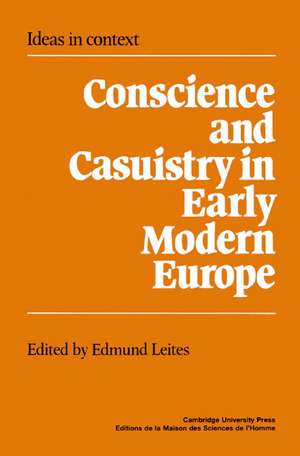Conscience and Casuistry in Early Modern Europe: Ideas in Context, cartea 9
Editat de Edmund Leitesen Limba Engleză Paperback – 15 mai 2002
Din seria Ideas in Context
-
 Preț: 200.64 lei
Preț: 200.64 lei -
 Preț: 200.38 lei
Preț: 200.38 lei -
 Preț: 200.28 lei
Preț: 200.28 lei - 9%
 Preț: 592.59 lei
Preț: 592.59 lei -
 Preț: 200.74 lei
Preț: 200.74 lei -
 Preț: 178.15 lei
Preț: 178.15 lei -
 Preț: 200.42 lei
Preț: 200.42 lei -
 Preț: 230.08 lei
Preț: 230.08 lei -
 Preț: 240.27 lei
Preț: 240.27 lei - 9%
 Preț: 627.28 lei
Preț: 627.28 lei -
 Preț: 224.34 lei
Preț: 224.34 lei - 11%
 Preț: 695.06 lei
Preț: 695.06 lei - 11%
 Preț: 693.36 lei
Preț: 693.36 lei - 9%
 Preț: 626.79 lei
Preț: 626.79 lei - 9%
 Preț: 626.37 lei
Preț: 626.37 lei -
 Preț: 169.70 lei
Preț: 169.70 lei - 11%
 Preț: 626.38 lei
Preț: 626.38 lei -
 Preț: 246.32 lei
Preț: 246.32 lei - 8%
 Preț: 530.33 lei
Preț: 530.33 lei - 9%
 Preț: 592.80 lei
Preț: 592.80 lei - 27%
 Preț: 648.35 lei
Preț: 648.35 lei - 9%
 Preț: 592.06 lei
Preț: 592.06 lei -
 Preț: 186.95 lei
Preț: 186.95 lei -
 Preț: 188.70 lei
Preț: 188.70 lei -
 Preț: 192.99 lei
Preț: 192.99 lei -
 Preț: 160.82 lei
Preț: 160.82 lei - 11%
 Preț: 583.02 lei
Preț: 583.02 lei -
 Preț: 276.77 lei
Preț: 276.77 lei - 11%
 Preț: 585.25 lei
Preț: 585.25 lei -
 Preț: 185.17 lei
Preț: 185.17 lei -
 Preț: 178.45 lei
Preț: 178.45 lei - 11%
 Preț: 583.56 lei
Preț: 583.56 lei -
 Preț: 179.68 lei
Preț: 179.68 lei - 11%
 Preț: 584.90 lei
Preț: 584.90 lei -
 Preț: 375.56 lei
Preț: 375.56 lei -
 Preț: 284.17 lei
Preț: 284.17 lei -
 Preț: 285.54 lei
Preț: 285.54 lei -
 Preț: 298.92 lei
Preț: 298.92 lei -
 Preț: 282.87 lei
Preț: 282.87 lei -
 Preț: 288.04 lei
Preț: 288.04 lei -
 Preț: 284.56 lei
Preț: 284.56 lei
Preț: 335.93 lei
Nou
Puncte Express: 504
Preț estimativ în valută:
64.29€ • 66.87$ • 53.07£
64.29€ • 66.87$ • 53.07£
Carte tipărită la comandă
Livrare economică 12-26 aprilie
Preluare comenzi: 021 569.72.76
Specificații
ISBN-13: 9780521520201
ISBN-10: 0521520207
Pagini: 280
Ilustrații: index
Dimensiuni: 153 x 229 x 19 mm
Greutate: 0.4 kg
Ediția:Revised
Editura: Cambridge University Press
Colecția Cambridge University Press
Seria Ideas in Context
Locul publicării:Cambridge, United Kingdom
ISBN-10: 0521520207
Pagini: 280
Ilustrații: index
Dimensiuni: 153 x 229 x 19 mm
Greutate: 0.4 kg
Ediția:Revised
Editura: Cambridge University Press
Colecția Cambridge University Press
Seria Ideas in Context
Locul publicării:Cambridge, United Kingdom
Cuprins
Introduction Edmund Leites; 1. Governing conduct James Tully; 2. Laxity and liberty in seventeenth-century English political thought Margaret Sampson; 3. Casuistry and character Edmund Leites; 4. Prescription and reality Jean Delumeau; 5. The 'new art of lying': equivocation, mental reservation, and casuistry Johann P. Sommerville; 6. Kant and casuistry H.-D. Kittsteiner; 7. Moral arithmetic: seven sins into ten commandments John Bossy; 8. Optics and sceptics: the philosophical foundations of Hobbes's political thought Richard Tuck; Index.
Recenzii
'This collection is a demonstration of the value of the aims and methods advocated by the general editors of the series, 'Ideas in Context'. The examination of casuistry and its reputation, of associated ideas of conscience and of the theory and practice of moral education in the early modern period continually reveals connections between morality as a practical and public concern and more systematic and 'philosophical' ethical theory. The result is immensely stimulating and suggestive (not less so for the disagreements among contributors), and constitutes a challenge to philosophers to join with historians in pursuit of a more serious and professional history of ethics than is yet available.' M. R. Ayers, Wadham College, Oxford
Descriere
An examination of a fundamental aspect of the intellectual history of early modern Europe.















